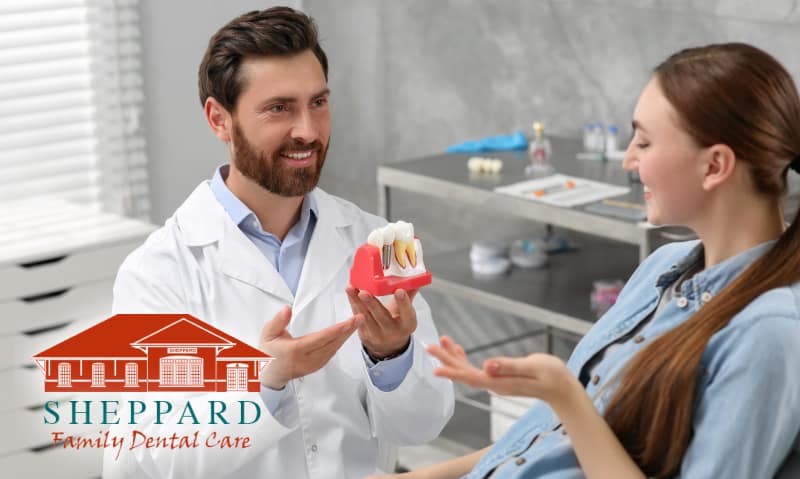The Mind-Body Link: How Dental Implants Help Restore Your Mental Wellness

If we told you that the health of your mouth directly affects how you feel (and vice versa), you might think we were pulling your leg—but it’s true! The mind-body connection is all about how our thoughts and emotions affect our oral health. It shows that mental well-being influences our habits, stress levels, and behaviors, including having a ripple effect on our overall dental health. Understanding this link helps us see how psychological factors contribute to oral issues and emphasizes the importance of maintaining mental well-being for better overall oral health.
Our smile is a crucial asset, enabling communication, creating great first impressions, boosting morale, and enhancing self-esteem. Losing a tooth can trigger negative emotions, including denial, frustration, depression, and anxiety. Regardless of your identity, profession, or social status, missing teeth can have detrimental effects on mental health.
Restorative dentistry, such as dental implants, can have a positive impact on mental wellness by restoring confidence and self-esteem. The visible gap in a person’s smile may cause social anxiety and reluctance to engage in social activities. Dental implants provide a natural-looking and permanent solution, restoring the appearance of a complete smile.
The Psychological Impact of Missing Teeth
Your smile is one of the first things people notice about you, and is directly responsible for shaping social and professional interactions. It’s a memorable aspect of your identity. Missing teeth can affect your confidence, which, in turn, influences your communication with others at work and in social settings.
Tooth loss is often accompanied by social stigma, leading to feelings of embarrassment. People with missing teeth may face unfair stereotypes, being perceived as neglectful of their oral health, physically unfit, or economically disadvantaged. However, the reality is that tooth loss can result from various causes unrelated to these stereotypes. Individuals with missing teeth may even withdraw from social interactions due to concerns about their appearance, affecting their ability to engage with others.
Highlighting the profound effect of oral health on mental well-being and self-perception underscores the crucial connection between a healthy mouth and positive mental states.
Dental Implants: Restoring Physical and Emotional Balance
Dental implants, titanium posts inserted into the jawbone by a dentist or oral surgeon, offer robust support for artificial teeth, such as crowns, bridges, or dentures. They not only replace missing teeth, but comprehensively restore oral function and aesthetics. Implants integrate with the jawbone, providing stability when a person is chewing and speaking, fostering a natural and confident bite. Additionally, they contribute to bone structure maintenance, preventing the bone deterioration that occurs when there is no tooth to stimulate the bone. This results in an appealing smile and restored oral functions, promoting overall health.
Beyond the physical benefits, the restoration of oral function through dental implants significantly enhances self-confidence and mental health. The stable foundation and the aesthetic improvement allow individuals to engage in daily activities without discomfort, promoting self-esteem. In essence, dental implants play a vital role in promoting comprehensive well-being, going beyond the mere replacement of teeth.
Empowerment and Self-Confidence: The Mental Wellness Benefits of Dental Implants
Dental implants empower individuals to confidently engage in social activities, by providing a natural-looking solution for tooth loss. With implants, there’s no worry about appearance or teeth functionality during social interactions. The secure foundation ensures a comfortable, natural smile, enabling confident self-expression. Whether you’re enjoying a meal, laughing, or chatting with friends, dental implants allow unrestricted participation in social activities.
Improved social interactions resulting from dental implants can have positive effects on mental wellness in several ways.
Enhanced Self Esteem
Dental implants offer a natural, aesthetically pleasing appearance, fostering increased confidence in one’s smile. In many cases, your implant will be an improvement on the missing tooth, bringing you closer to the smile of your dreams.
Reduced Social Anxiety
Dental implant recipients, assured of their smile’s natural look and function, often experience diminished social anxiety. The alleviation of fear related to oral issues enhances the enjoyment of social interactions.
Increased Social Participation
The restoration of oral function enables comfortable engagement in social activities like eating, speaking, and smiling. There’s no need to worry that the gap caused by a missing tooth is obvious or that people are staring.
Positive Feedback Loop
Positive social interactions create a feedback loop, reinforcing overall happiness. The confidence gained from improved oral health extends to other areas of your life, nurturing a positive mental state.
Better Relationships
Confident and comfortable social interactions contribute to stronger relationships. Enhanced communication and a genuine smile positively influence how others perceive and respond to you, further boosting mental wellness.
Reach out to Sheppard Family Dental Care to start your tooth replacement journey.
The positive effects of dental implants on social interactions creates a ripple effect, influencing various aspects of mental wellness, from self-esteem to overall life satisfaction. With options like affordable bridges, dentures, and dental implants, you can speak, eat, and smile confidently. Contact Sheppard Family Dental Care in Lawton, Oklahoma, to begin your dental implant journey.
